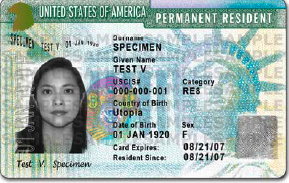 An immigration lawyer who has been in practice for any respectable period of time encounters fun, funny, and bizarre situations. The attorneys at Romben Law, APC in Los Angeles have, among them, 40 years of experience, and a recent article describes how the Department of Justice uses your own Google enties, and postings to Facebook, Twitter, and other social networking sites as evidence against you. If you post about the car you stole, or you post your picture taking a hit from your favorite bong, that information can be used against you!
An immigration lawyer who has been in practice for any respectable period of time encounters fun, funny, and bizarre situations. The attorneys at Romben Law, APC in Los Angeles have, among them, 40 years of experience, and a recent article describes how the Department of Justice uses your own Google enties, and postings to Facebook, Twitter, and other social networking sites as evidence against you. If you post about the car you stole, or you post your picture taking a hit from your favorite bong, that information can be used against you!
Romben Law, APC are located in the Hollywood area of Los Angeles, and we are no strangers to clients with “fast” lifestyles. Years ago, one American client applied for Legal Residence for his wife, who was from Scandinavia. Imagine their shock — and mine — when at the immigration interview the adjudicator pulled up photos that were posted on the couple’s Facebook page — photos that depicted a very frisky sex party that they had hosted at their Hollywood Hills home two months earlier. Not having been invited to the party myself, I had no idea about this couple’s hobby, and they certainly never told me about it. Now, there is nothing illegal in California about having a some like-minded friends come for an evening’s fun and recreation. However, this is hardly the kind of thing that promotes a favorable experience with generally-suspicious immigration officers. (Yes, the green card was eventually granted.)
So: at Romben Law, APC, we have been telling immigration applicants for years that if there is ANYthing found on a Google search or posted on social networking sites — even postings and activities that are perfectly legal — that they would rather not show to the Department of Homeland Security, it would be wise to remove them. Better to be safe than to be put into the position of explaining to USCIS what you do with that trapeze in the living room. –jcf
 Please remember that fees for most filings with US Citizenship and Immigration Services (USCIS) will increase on 23 November 2010. Applications submitted with incorrect fees will be rejected, and such a rejection could result in the applicant falling out of status in the USA, so it’s important to be sure to file with the correct fee.
Please remember that fees for most filings with US Citizenship and Immigration Services (USCIS) will increase on 23 November 2010. Applications submitted with incorrect fees will be rejected, and such a rejection could result in the applicant falling out of status in the USA, so it’s important to be sure to file with the correct fee. Immigration Visa Attorney Blog
Immigration Visa Attorney Blog


 The day when you could become a US Legal Permanent Resident (LPR) simply by walking off of your boat has long passed. Since that time, paperwork or cards documenting an immigrant’s status have taken various forms, the most well known being the “green card.” The “green card” was a plastic laminated card issued by the US Immigration and Nationality Service (INS) so that immigrants could demonstrate that they were legally in the USA. Here in Los Angeles at Romben Law, APC, virtually everyone — even the attorneys — will at least some of the time call the Legal Permanent Resident card “the green card” It’s simply a habit.
The day when you could become a US Legal Permanent Resident (LPR) simply by walking off of your boat has long passed. Since that time, paperwork or cards documenting an immigrant’s status have taken various forms, the most well known being the “green card.” The “green card” was a plastic laminated card issued by the US Immigration and Nationality Service (INS) so that immigrants could demonstrate that they were legally in the USA. Here in Los Angeles at Romben Law, APC, virtually everyone — even the attorneys — will at least some of the time call the Legal Permanent Resident card “the green card” It’s simply a habit.  Border guards are not known to be the friendliest people in Federal service. The immigration attorneys at Romben Law, APC in Los Angeles routinely hear stories of border guards shouting at aliens who are telling the truth, bluntly telling aliens, “you are lying to me,” or asking in a hostile manner, “why are you lying to me?” The border guards do this, even when they do not really think someone is lying. They do it to destabilize or disturb the alien, to get the alien to make an error or say something wrong. Basically, it is a trap.
Border guards are not known to be the friendliest people in Federal service. The immigration attorneys at Romben Law, APC in Los Angeles routinely hear stories of border guards shouting at aliens who are telling the truth, bluntly telling aliens, “you are lying to me,” or asking in a hostile manner, “why are you lying to me?” The border guards do this, even when they do not really think someone is lying. They do it to destabilize or disturb the alien, to get the alien to make an error or say something wrong. Basically, it is a trap. An immigration lawyer who has been in practice for any respectable period of time encounters fun, funny, and bizarre situations. The attorneys at Romben Law, APC in Los Angeles have, among them, 40 years of experience, and a recent
An immigration lawyer who has been in practice for any respectable period of time encounters fun, funny, and bizarre situations. The attorneys at Romben Law, APC in Los Angeles have, among them, 40 years of experience, and a recent  Two very strong aftershocks hit Chile today, right around the time of the inauguration of Chile’s new president, Sebastián Piñera, in Santiago. Immigration lawyers at Romben Law, APC in Los Angeles have received a continuous flow of inquiries about any possible immigration benefits that might be made available to Chilenos. While el Presidente Piñera may have promised una nueva forma de gobernar, it is mostly business as usual with US Citizenship and Immigration Services. Some small developments:
Two very strong aftershocks hit Chile today, right around the time of the inauguration of Chile’s new president, Sebastián Piñera, in Santiago. Immigration lawyers at Romben Law, APC in Los Angeles have received a continuous flow of inquiries about any possible immigration benefits that might be made available to Chilenos. While el Presidente Piñera may have promised una nueva forma de gobernar, it is mostly business as usual with US Citizenship and Immigration Services. Some small developments: